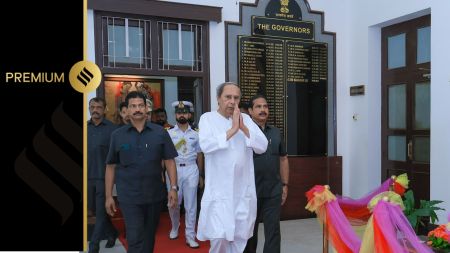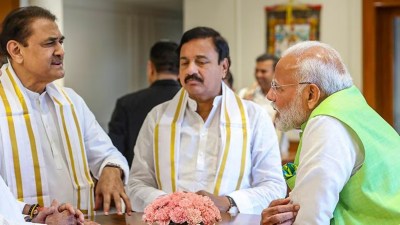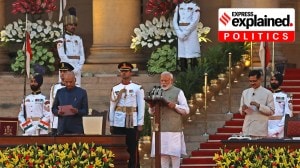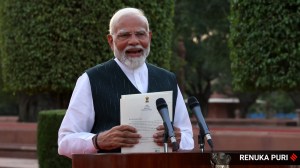- India
- International
Centre’s farm laws transgress Constitution’s federal structure
Dushyant Dave writes: Centre's farm laws will create monopolies in agriculture production and trade, and hurt farmers.
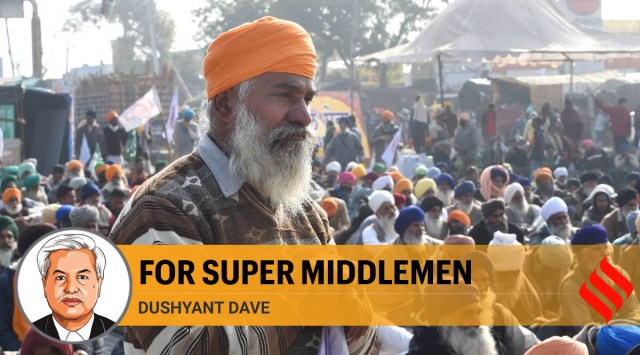 Farmers during their ongoing agitation over the new farm laws, at Singhu Border in New Delhi, Wednesday. (PTI Photo: Shahbaz Khan)
Farmers during their ongoing agitation over the new farm laws, at Singhu Border in New Delhi, Wednesday. (PTI Photo: Shahbaz Khan)The Constitution of India is a “fundamental document”, as declared by B R Ambedkar on September 17, 1949 during the Constituent Assembly debates. To him, this document defined the powers and functions of the three organs of the state — the legislature, executive and judiciary: “…in fact, the purpose of a Constitution is not merely to create the organs of the State but to limit their authority because if no limitation was imposed upon the authority of organs, there will be complete tyranny and oppression… it would result in utter chaos.”
The Farmers (Empowerment and Protection) Agreement on Price Assurance and Farm Services Act, 2020 (Act 20 of 2020), Farmers’ Produce Trade and Commerce (Promotion and Facilitation) Act, 2020 (Act 21 of 2020) and the Essential Commodities (Amendment) Act (ECA), 2020 (No. 22 of 2020), have been enacted by Parliament, and seemingly step beyond its authority, creating chaos.
Let us examine them from a constitutional perspective. The Supreme Court (SC) has consistently held agriculture to be a state subject. A constitution bench in ITC Ltd. v. Agricultural Produce Market Committee (2002) held: “The Constitution of India deserves to be interpreted, language permitting, in a manner that it does not whittle down the powers of the State Legislature and preserves the federalism while also upholding the Central supremacy,” holding that Parliament is incompetent to legislate on agriculture.
By Act 22, Parliament has virtually made the ECA, 1955, redundant. Central and state governments can now control the supply and price of essential commodities only in exceptional circumstances. Far from sub-serving the “interests of the general public”, interests of large businesses will be served.
Act No. 20 and 21 of 2020, enacted by Parliament are clearly referable to Entry 14 and Entry 28 of List II, which include “agriculture” and “markets”. The Constitution distributes in Schedule VII, subjects or matters to be legislated thus: List I for Parliament, List II for state legislatures, and List III for concurrent exercise by both, subject to limitations. Clearly, the Constitution-framers wanted states to deal exclusively with matters relating to agriculture.

T T Krishnamachari, member of the Drafting Committee, made the following pertinent point in the Constituent Assembly on June 14, 1949: “I am one of those who believes, and believes very firmly, that wherever we assign a field to the provinces in which they can act we must leave that province in sole charge of that field…”
Shibanlal Saxena moved an amendment seeking “…that agriculture and land revenue systems all over India should be amenable to planning on an all-India scale”. This amendment was not accepted by Krishnamachari and was rejected. Brajeshwar Prasad proposed an amendment arguing that “agriculture is a vital subject… but here I am only saying that the power to legislate on this subject must remain exclusively in the hands of the Centre.” Krishnamachari rejected this saying, that “agriculture happens to be the principal industry in this country, and practically one of the main functions of the State, and beyond taking certain powers for the purpose of co-ordination, I do not think the Centre is at all capable of handling this vast problem…”
The two farm laws, ostensibly meant to create an ecosystem where farmers and traders enjoy the freedom of choice relating to the sale and purchase of farmers’ produce, contain extraordinary provisions opposed to the regulation of markets by states for the sale and purchase of agricultural produce. In M.C. V. S. Arunachala Nadar Etc vs The State Of Madras & Others, the SC, speaking through J Subba Rao, asserted “that cultivators suffer from many handicaps: to begin with he is illiterate and in general ignorant of prevailing market prices especially in regard to commercial crops… The establishment of regulated markets must form an essential part of any ordered plan of agricultural development in this country.” The Court observed: “The aforesaid observations describe the pitiable dependence of the middle-class and poor ryots on the middlemen and petty traders, with the result that the cultivators are not able to find markets for their produce wherein they can expect reasonable price for them.”
The new farm laws, far from providing regulated markets, purport to leave cultivators to the mercy of the free market. A farming agreement for one or five years, providing for various facets of the supply of produce, including time, standards and price and other related matters, the power of inspection and rejection can create serious hurdles for the illiterate and ignorant cultivator. State laws do not apply once a farming agreement has been entered into and no stock limit applies to quantities of farming produce purchased thereunder, notwithstanding the ECA. The freedom to carry on inter-state or intra-sate trade and commerce in farm produce is now absolute. No levy or fee can be levied under the state APMC Act or any other law of the state.
The farm laws are clearly aimed at creating trading giants in agricultural produce who can control agricultural activity. These laws create “super middlemen” to replace the existing smaller middlemen, hurting the cultivators even more. The availability of regulated markets and the hope for fair prices stand shattered. Farm laws run counter to the state’s policy, inter-alia, to distribute material resources to sub-serve common good, a Directive Principle.
In its 2019 election manifesto, the BJP had made 12 promises to farmers declaring, “at the very beginning of our current term, Prime Minister Modi embarked on a mission to double farmers’ income. We will make all efforts to achieve this goal by 2022.” So, what made it take a complete U-Turn? And why is the PM not willing to keep up his promise? We will never know.
This article first appeared in the print edition on January 22, 2021 under the title ‘For super middlemen’. The writer is a senior advocate and former president of the Supreme Court Bar Association.
Click here for real-time updates on the Lok Sabha Election Results 2024
EXPRESS OPINION
More Explained
Jun 09: Latest News
- 01
- 02
- 03
- 04
- 05


